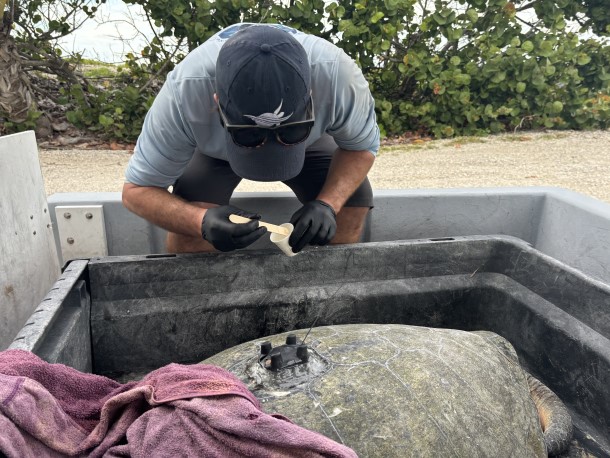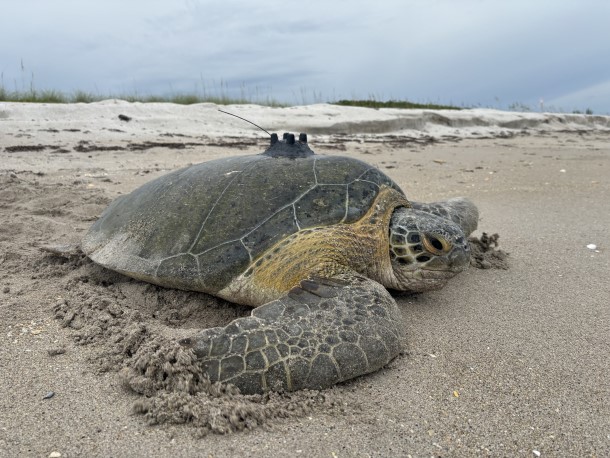Males have joined the turtle tagging party
Posted on July 15, 2024
Another satellite tag deployed! As part of our new turtle tagging project project, satellite telemetry tags are being deployed to explore how Kemp’s ridley and green sea turtles utilize the water column in habitats along the east coast of the United States. This post highlights the very first tag deployed by one of our project partner organizations.
Researchers with Inwater Research Group (IRG), supported by Dr. Kate Mansfield with the UCF Marine Turtle Research Group and Andrew DiMatteo of CheloniData LLC, deployed a satellite-linked data logger on the project’s 1st adult male green turtle. The turtle was tagged and released in St. Lucie County, Florida in late June. These tags will collect dive depth and temperature records, as well as dive behavior data, allowing researchers to explore the diving ecology of these animals. These data can be used to account for animals’ unseen by aerial observers in broad scale surveys (i.e. availability bias), allowing for better estimation of at-sea animal populations, in addition to a wealth of other ecological and conservation applications.
IRG Senior Biologist Cody Mott applying epoxy to a satellite telemetry tag on the carapace of an adult male green sea turtle.
The satellite-tagged adult male green turtles will sample nearshore habitat utilization while they look for female green turtles to mate with during the nesting season. By the end of the summer, these males will either travel south to foraging habitats in the Florida Keys and wider Caribbean or make their way further north along the east coast of the US. IRG hopes to encounter more male greens as the mating season continues and deploy additional tags so that we can better understand the migratory pathways of this understudied group of animals.
Unlike their female counterparts, adult male turtles do not come ashore and must be captured while they are “in-water”, something that IRG biologists are highly specialized in. The encounter and capture of these male green turtles is part of IRG’s work at its St. Lucie Site, a nuclear power plant located in St. Lucie County, Florida. Here, IRG has worked with industry leaders to create a program that safely and efficiently captures, tags, and releases all sea turtles that are entrained into the plant’s canal when water is drawn in from the Atlantic Ocean to cool the reactors. When you think of sea turtle conservation, a nuclear power plant probably doesn’t come to mind; however, the invaluable data collected from these animals (including but not limited to a thorough health assessment, weight, measurements, tags, and photographs) provides critical insight to many species and life stages that are found in Atlantic coastal waters, many of which are otherwise inaccessible to most other researchers.
A male green sea turtle makes his way back to the ocean after having a satellite telemetry tag attached to his carapace.
“Male sea turtles are an understudied yet critical component of sea turtle populations. We are always excited to encounter males during our work, and we are even more excited to be able to incorporate the study of males into these larger continent spanning studies. We are looking forward to satellite tagging additional males over the coming years.” ~ Ryan Welsh (Senior Biologist, Inwater Research Group)
Stay tuned for news of future deployments both in Florida and along the east coast.
Animals tagged and sampled under Inwater Research Groups’ protected species permits including Florida permit number MTP-24-125B
Follow this project and Inwater Research Group on social media:
Instagram: www.instagram.com/inwaterresearch
Facebook: www.facebook.com/inwaterresearch
Website: www.inwater.org



